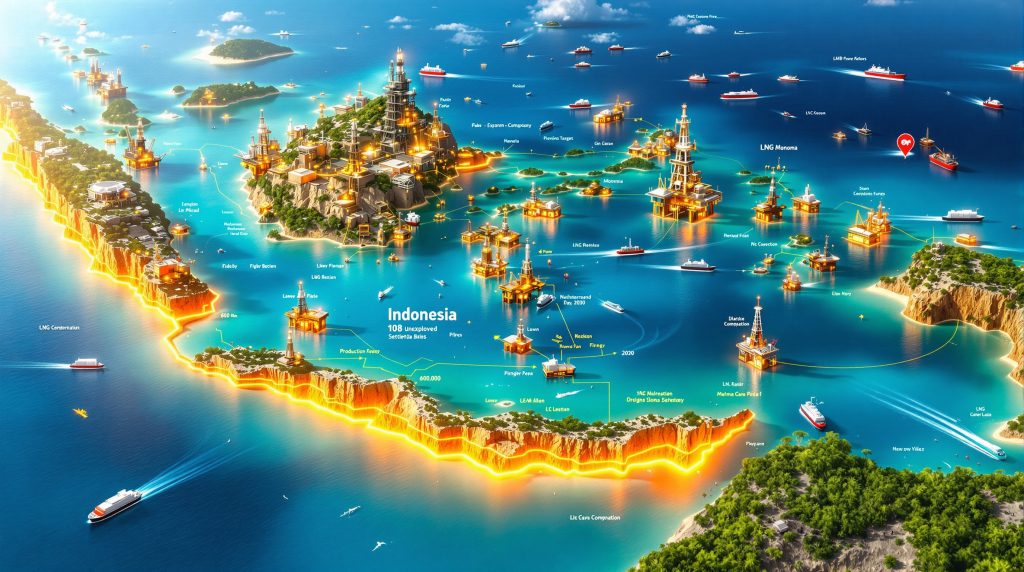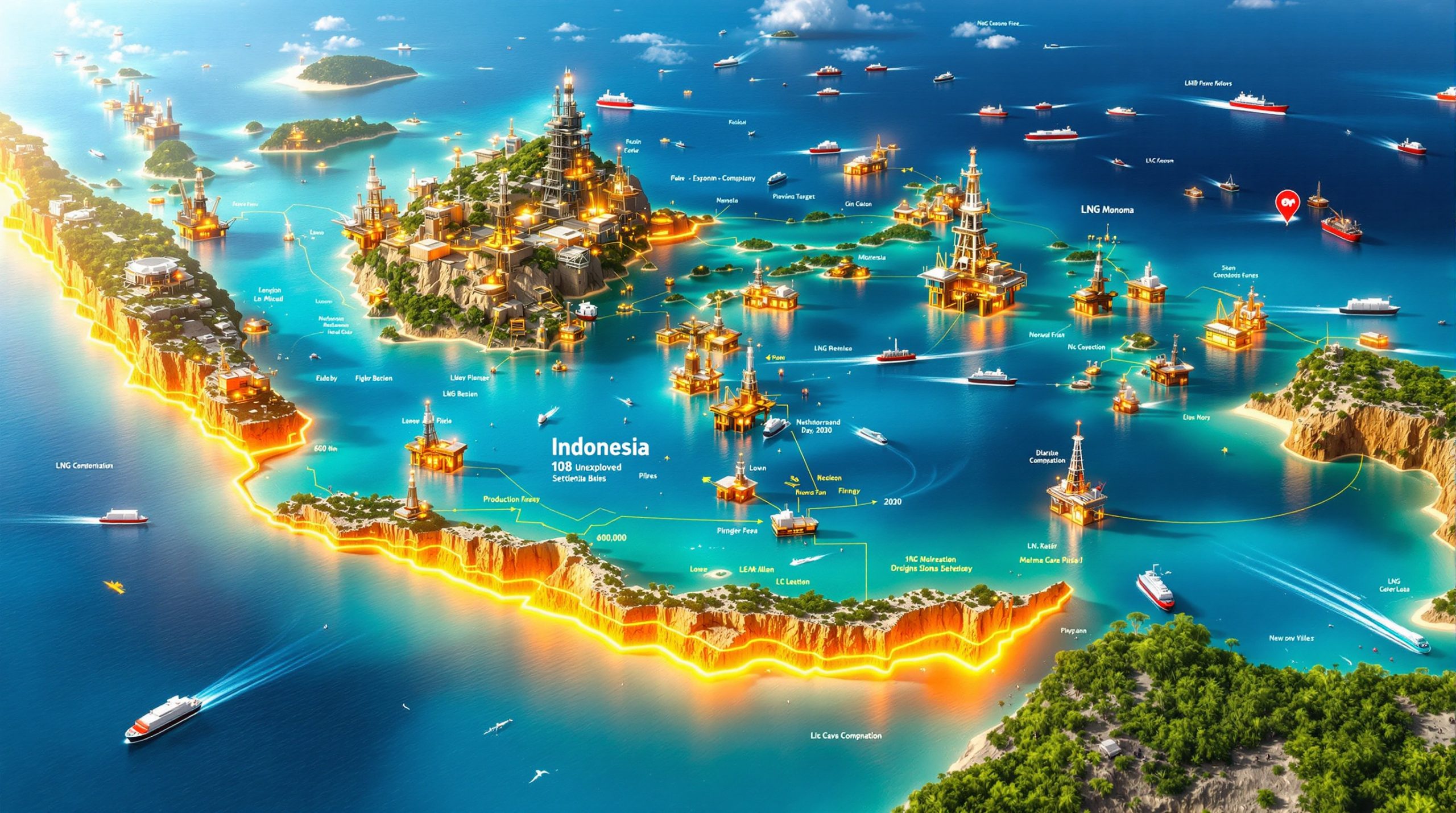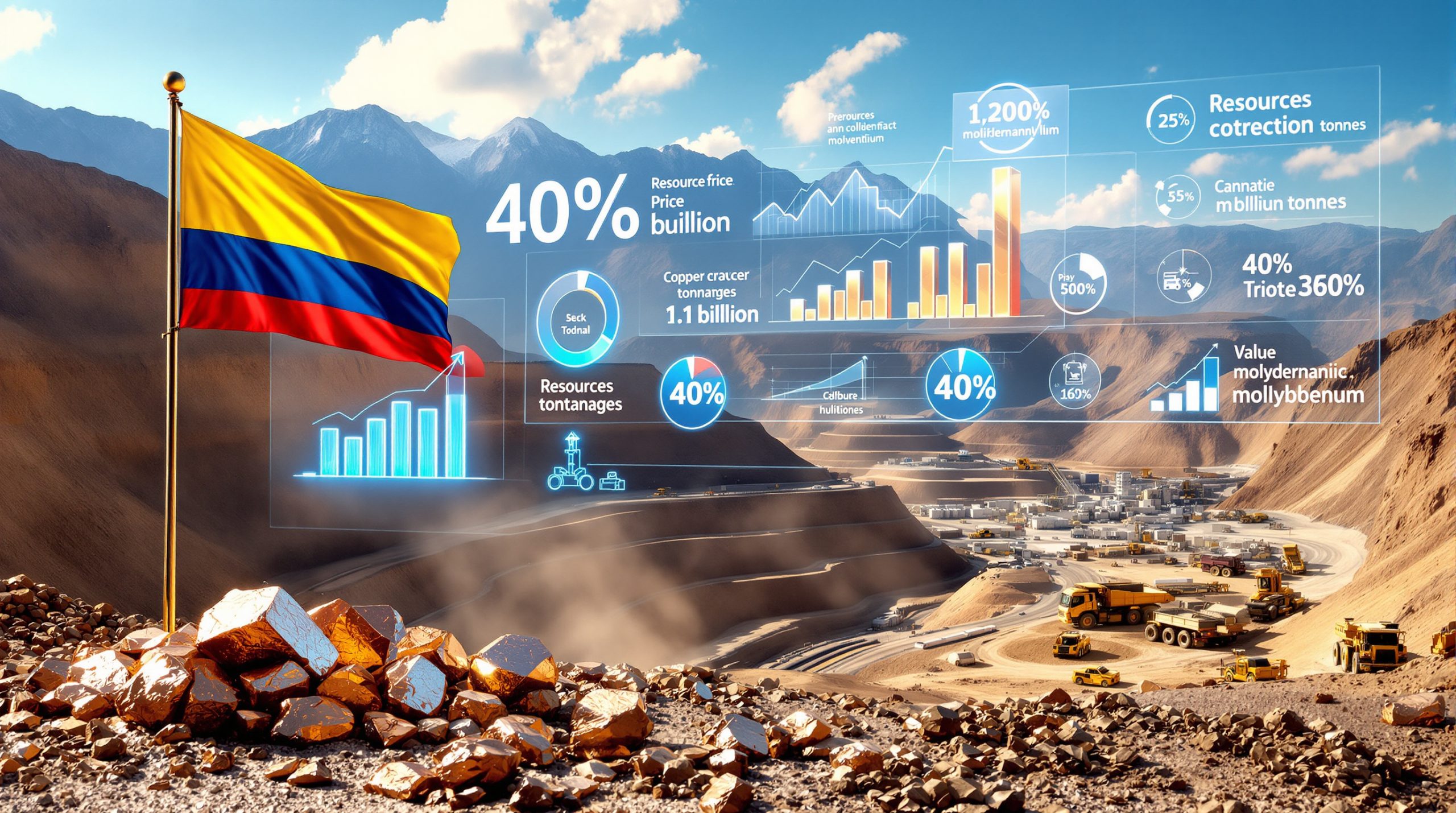Strategic Exploration Initiative: Southeast Asia's Hydrocarbon Renaissance
The global energy landscape stands at a pivotal moment where resource scarcity concerns collide with escalating demand from emerging economies. Against this backdrop, major oil-producing nations are reassessing their geological portfolios, seeking untapped reserves that could reshape regional energy dynamics. This strategic imperative becomes particularly pronounced in Southeast Asia, where geological complexity meets urgent energy security requirements.
Indonesia invites firms to explore 108 untapped oil and gas basins represents a fundamental shift in regional upstream strategy. This comprehensive exploration initiative signals more than routine licensing rounds – it reflects a calculated response to evolving global energy markets where supply diversification has become paramount.
Indonesia's Geological Treasure: Understanding the 108-Basin Portfolio
Basin Distribution and Geological Characteristics
Indonesia's sedimentary basin network spans one of the world's most geologically diverse regions, created through complex tectonic interactions over millions of years. Furthermore, the archipelago's position at the intersection of major tectonic plates has generated numerous hydrocarbon-bearing formations with varying exploration potential.
The 108 unexplored basins encompass several distinct geological environments. Tertiary Basins, located primarily in Sumatra and Kalimantan, contain proven source rock sequences with excellent hydrocarbon generation potential. Many remain unexplored due to infrastructure constraints and challenging operating conditions.
Deepwater Continental Margins offshore areas along Java, Sulawesi, and Papua offer significant exploration opportunities in water depths exceeding 1,000 meters. These regions require specialized drilling capabilities but hold substantial resource potential.
Frontier Onshore Areas in remote terrestrial basins in eastern Indonesia present unique geological characteristics with limited previous exploration activity. Consequently, these areas often feature complex structural geology requiring advanced seismic interpretation techniques.
Resource Assessment and Production Targets
While specific reserve estimates for the 108 unexplored basins remain confidential, industry analysis suggests significant hydrocarbon potential across multiple play types. In addition, the Indonesian government has indicated that successful development of these areas could substantially increase national production capacity.
Current Indonesian oil production fluctuates around historical levels, particularly when compared to the US oil production decline affecting global markets. For instance, natural gas production shows stronger growth prospects, especially given Indonesia's established LNG export infrastructure and regional demand growth.
Investment Framework: Attracting International Capital
Production Sharing Contract Evolution
Indonesia's approach to upstream development has evolved significantly since the original production sharing contract (PSC) framework introduced in the 1960s. Moreover, modern PSC terms reflect changing global investment conditions and the need to attract capital for increasingly challenging exploration projects.
Key elements of Indonesia's current investment framework include flexible fiscal terms adjusted based on geological risk and development complexity, expedited approval processes for exploration permits and development plans, infrastructure development incentives particularly for frontier and remote areas, technology transfer requirements supporting local capacity building, and environmental compliance frameworks aligned with international standards.
Risk Mitigation Strategies
International oil companies evaluating Indonesian opportunities must assess multiple risk categories beyond typical geological uncertainties. However, successful basin development requires careful consideration of operational challenges including remote location accessibility requiring specialized logistics, limited existing infrastructure in frontier regions, complex regulatory environments across multiple government levels, and local content requirements impacting project economics.
Market Access Considerations encompass domestic fuel supply obligations potentially limiting export opportunities, regional competition from established producing areas, transportation infrastructure constraints affecting development timing, and currency and fiscal stability factors influencing long-term project returns.
Regional Energy Security Implications
ASEAN Market Dynamics
Indonesia's basin development strategy extends beyond domestic energy security, potentially reshaping regional hydrocarbon supply patterns. Furthermore, Southeast Asian energy demand continues growing steadily, driven by population growth and industrial development across multiple countries.
Regional energy security considerations include natural gas demand growth particularly in power generation and industrial applications, crude oil import dependency across multiple ASEAN economies, infrastructure connectivity enabling regional energy trade, and clean energy transition requirements supporting natural gas as a bridge fuel.
The oil market dynamics affecting global pricing will undoubtedly influence Indonesia's strategic positioning. Additionally, understanding natural gas price trends becomes crucial for project economics assessment.
Geopolitical Positioning
Indonesia's upstream expansion occurs within a complex geopolitical environment where energy supply security has gained heightened importance. Consequently, regional powers increasingly view energy independence as a strategic priority, influencing investment decisions and partnership arrangements.
The archipelago nation's enhanced production capacity could strengthen its position within ASEAN energy cooperation frameworks while reducing regional dependence on external suppliers. This strategic positioning becomes particularly relevant as global energy trade patterns continue evolving.
Technical Execution Challenges
What Are the Frontier Exploration Complexities?
Developing Indonesia's unexplored basins requires overcoming significant technical obstacles that have previously limited exploration activity. These challenges span multiple operational categories including seismic survey requirements encompassing advanced 3D seismic acquisition in challenging terrain conditions, marine seismic programs in deepwater environments, processing techniques adapted for complex geological structures, and integration of gravity and magnetic data for comprehensive geological understanding.
Drilling and Completion Technology requirements include deepwater drilling capabilities for offshore prospects, extended reach drilling for remote onshore locations, specialized completion techniques for unconventional reservoir types, and enhanced oil recovery methods for mature field optimization.
Infrastructure Development Needs
Successful monetization of discovered hydrocarbons requires substantial infrastructure investments that often exceed exploration and development costs. For instance, critical infrastructure requirements vary significantly in scope and investment scale.
Pipeline Networks require high investment levels with development timelines of 3-5 years. Processing Facilities demand very high investment over 4-6 years, while Port and Terminal Infrastructure needs moderate to high investment spanning 2-4 years. Power Generation Systems require moderate investment over 1-3 years, and Transportation Networks need high investment across 5-7 years.
Investment Opportunities Across the Value Chain
Service Sector Beneficiaries
Indonesia invites firms to explore 108 untapped oil and gas basins creates opportunities across multiple service categories, each requiring specialized capabilities and substantial capital deployment. Geophysical Services companies stand to benefit from extensive survey programs required before drilling begins.
Indonesia's diverse geological environments demand sophisticated imaging technologies, particularly in areas with complex structural geology or challenging surface conditions. Drilling and Completion Services benefit from the scale of Indonesia's exploration program requiring significant drilling capacity additions.
Engineering and Construction sectors gain from infrastructure development accompanying successful discoveries. These projects often require specialized expertise in remote area construction and complex logistics management.
Technology Requirements and Market Gaps
Modern upstream development increasingly relies on advanced technologies that may require external partnerships or technology transfer arrangements. These include digital reservoir management systems enabling optimized production from complex reservoirs, advanced drilling techniques including horizontal and extended reach capabilities, enhanced recovery technologies maximizing resource extraction from discovered fields, and environmental monitoring systems ensuring compliance with evolving regulatory standards.
The critical minerals energy transition creates additional complexity, as companies must consider both traditional hydrocarbon development and future resource requirements.
Market Scenario Analysis
Optimistic Development Pathway
Under favorable conditions, Indonesia's basin development program could achieve substantial production increases within the next decade. This scenario assumes successful international investment attraction, efficient regulatory processes, and favorable geological outcomes across multiple exploration targets.
Key success factors include strong international oil company participation in licensing rounds, favorable exploration results in priority basin areas, efficient infrastructure development coordination, and stable regulatory and fiscal frameworks throughout development periods.
Moderate Progress Scenario
A more conservative outlook anticipates selective basin development focused on areas with established geological prospectivity and existing infrastructure proximity. However, this approach prioritizes lower-risk opportunities while building experience and infrastructure for more challenging prospects.
This pathway emphasizes phased development prioritizing proven geological trends, infrastructure optimization leveraging existing facilities, technology transfer programs building local capabilities, and environmental stewardship demonstrating responsible development practices.
Implementation Challenge Considerations
Potential obstacles to rapid basin development include infrastructure constraints, regulatory complexities, and market access limitations. Consequently, these challenges require careful risk assessment and mitigation strategies including remote area logistics and construction challenges, regulatory approval timelines and complexity, local community engagement and environmental compliance, and market volatility impacts on investment returns.
Global Energy Market Integration
Supply Chain Diversification Benefits
Indonesia's expanded upstream capacity contributes to global energy security through supply source diversification, reducing concentration risk in traditional producing regions. Furthermore, this diversification becomes particularly valuable during periods of geopolitical instability or supply disruption.
Regional energy trade enhancement opportunities include LNG export capacity expansion supporting Asian demand growth, crude oil quality diversification offering refiners additional feedstock options, natural gas pipeline connectivity enabling regional energy integration, and strategic petroleum reserve contributions supporting market stability.
Similar initiatives, such as Saudi exploration licenses, demonstrate the global trend toward expanding exploration activities to meet growing energy demands.
Investment Capital Mobilisation
Successful development of Indonesia's basin portfolio requires substantial capital mobilisation from multiple sources, including international oil companies, development finance institutions, and private equity investors. The scale of required investment reflects both the opportunity scope and associated technical challenges.
Financing mechanisms likely include traditional project finance structures for large-scale developments, joint venture arrangements spreading risk across multiple partners, government incentives reducing investor risk in frontier areas, and development bank participation supporting infrastructure investments.
Strategic Positioning for Energy Transition
Natural Gas as Transition Fuel
Indonesia's upstream strategy recognises natural gas's critical role in supporting clean energy transitions across Southeast Asia. Moreover, many of the unexplored basins show particular promise for gas discoveries, aligning with regional decarbonisation objectives.
Transition fuel applications include power generation displacing higher-emission alternatives, industrial process heating supporting manufacturing decarbonisation, petrochemical feedstock for essential chemical production, and marine fuel reducing shipping sector emissions.
Long-term Strategic Vision
Beyond immediate production increases, Indonesia's basin development initiative positions the country as a regional energy hub supporting both traditional hydrocarbon needs and energy transition requirements. This dual approach recognises the extended timeline required for complete renewable energy deployment while ensuring energy security throughout the transition period.
The strategic framework encompasses carbon capture and storage potential in depleted reservoir formations, critical minerals co-production supporting renewable energy infrastructure, technology development partnerships advancing clean energy solutions, and regional cooperation frameworks coordinating transition planning.
Indonesia invites firms to explore 108 untapped oil and gas basins represents a comprehensive approach to upstream resource development that extends far beyond traditional exploration programs. This initiative reflects a sophisticated understanding of evolving global energy markets where supply security, environmental responsibility, and economic development must be carefully balanced.
Success in this ambitious program requires coordination across multiple stakeholder groups, from international investors and technology providers to local communities and regulatory authorities. The outcomes will significantly influence not only Indonesia's energy future but also regional energy security and global supply chain resilience. As reported by the Jakarta Globe, this initiative represents one of the most significant upstream opportunities in the region. Additionally, Tempo's analysis highlights the scale of investment potential available to international firms.
Disclaimer: This analysis is based on publicly available information and industry assessments. Specific investment decisions should incorporate detailed due diligence and professional consultation. Energy sector investments carry substantial risks including geological, regulatory, environmental, and market factors that can significantly impact returns.
Seeking Opportunities in Indonesia's Energy Expansion?
Discovery Alert's proprietary Discovery IQ model delivers real-time alerts on significant mineral discoveries across the ASX, providing investors with actionable insights to identify opportunities ahead of the broader market. Begin your 30-day free trial today at Discovery Alert and secure your market-leading advantage in resource sector investments.




